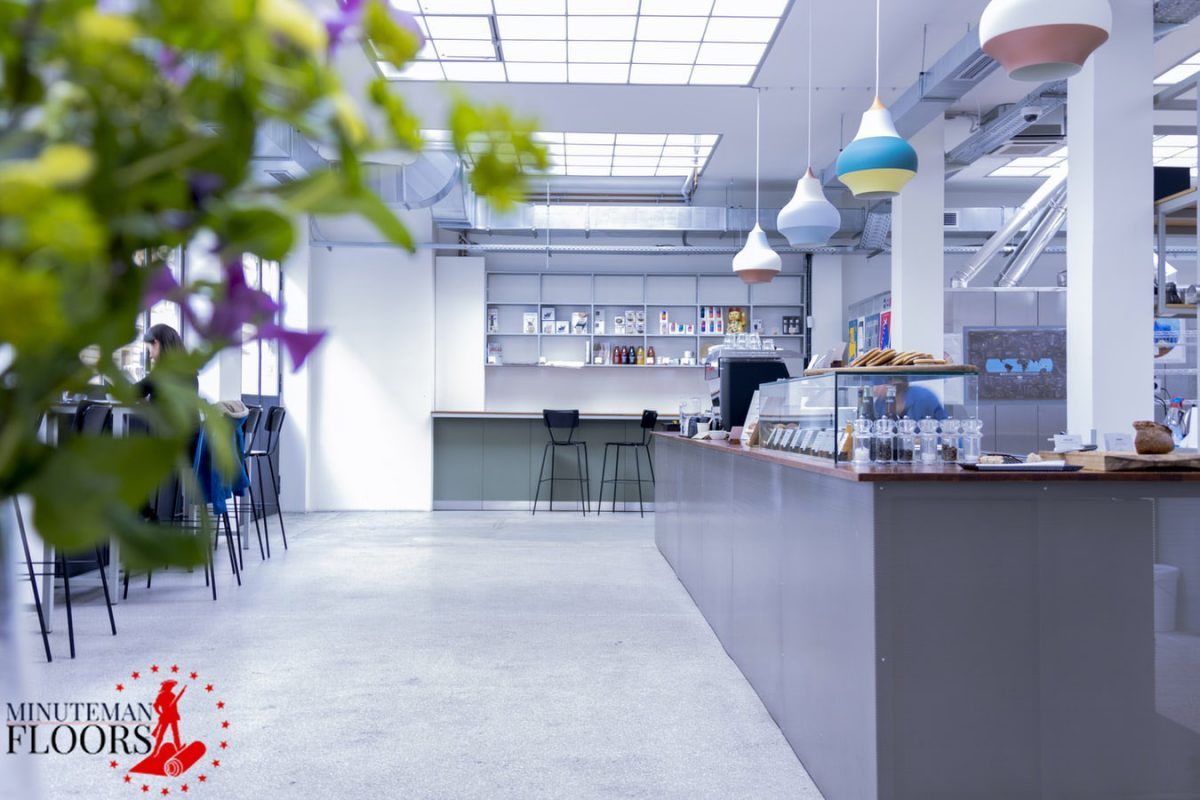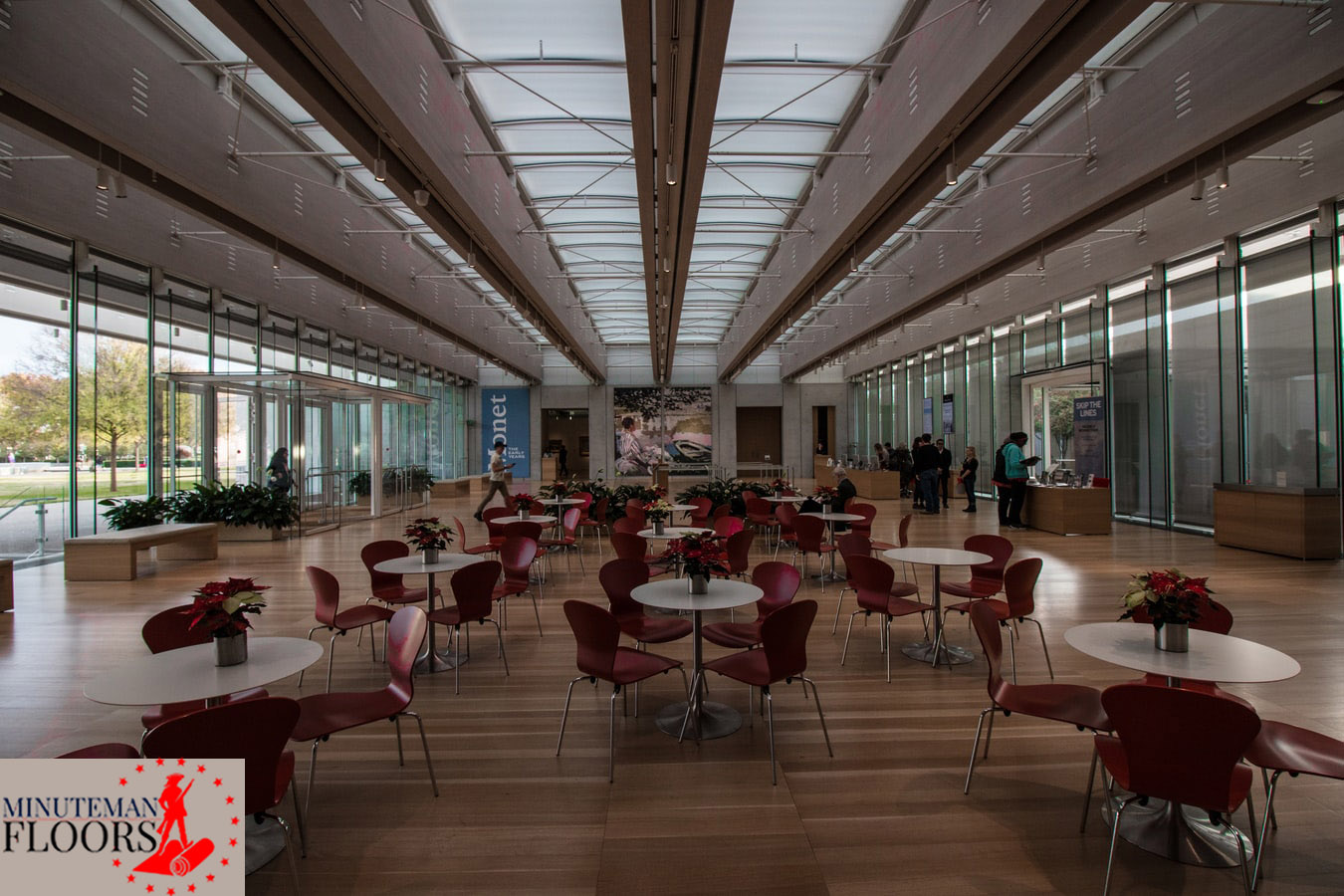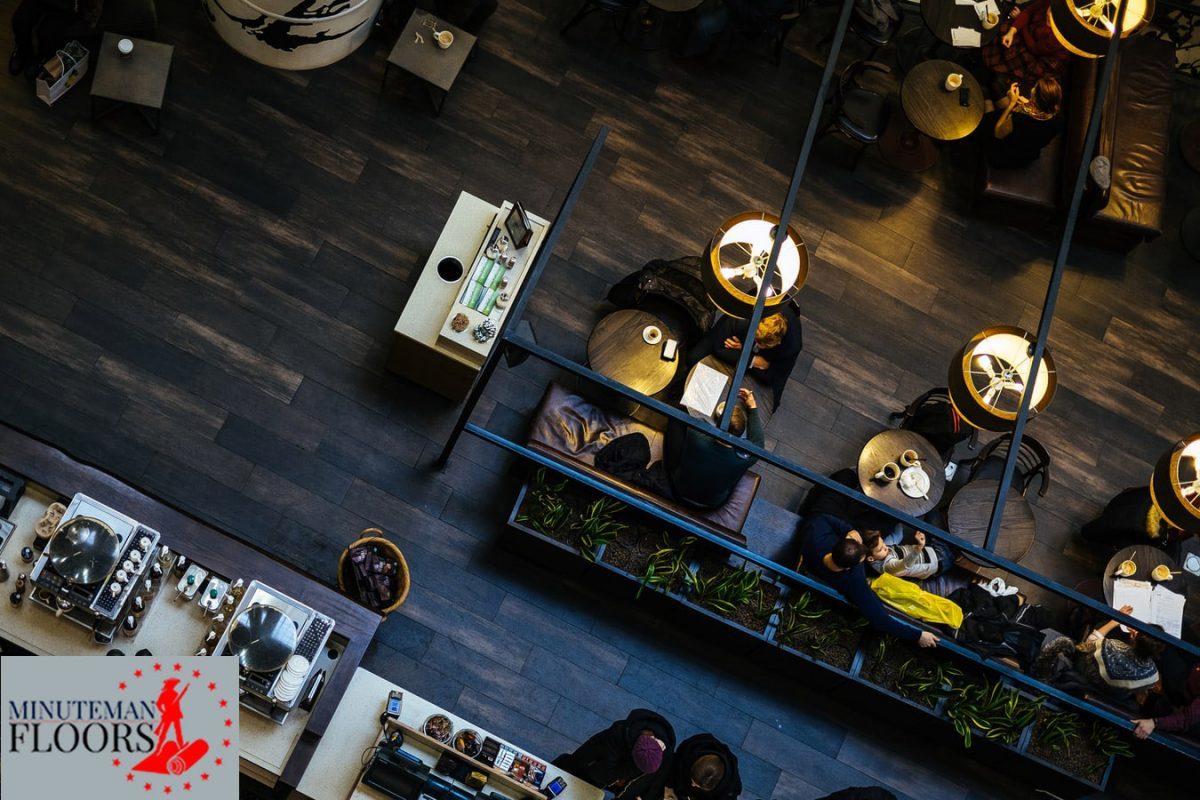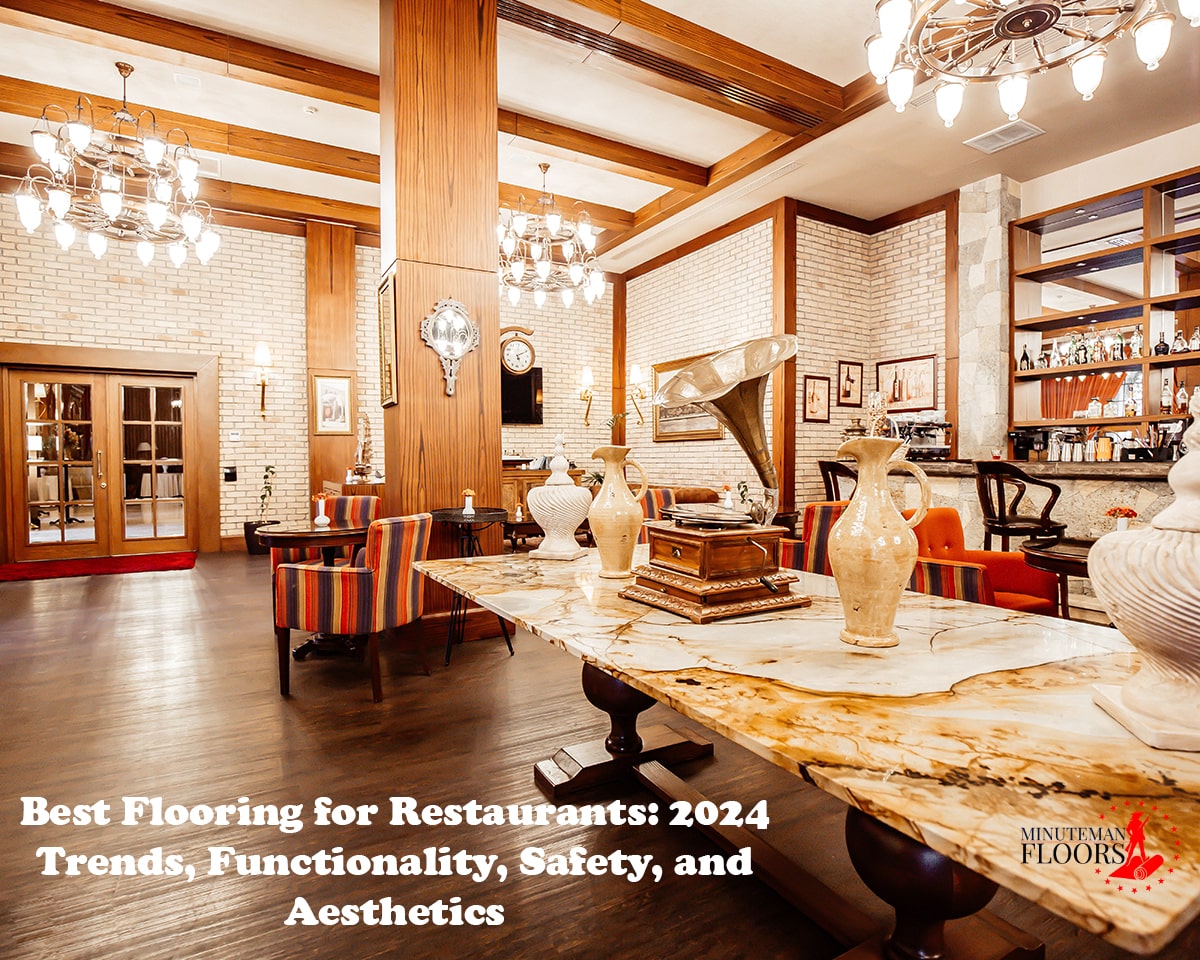Here is a comprehensive but simple guide from our flooring experts on choosing the best flooring for restaurants. Restaurants and coffee houses are bustling environments with lots of foot traffic, spills, and safety hazards.
At the same time, they need to be appealing and create a good atmosphere for the customers. So, as a restaurant owner, you need to select the flooring material more carefully. But we have made it easy for you.
In this article, you’ll learn about the most important factors to consider when selecting restaurant flooring materials, what type of flooring is best for each area in a restaurant, tips on restaurant flooring maintenance, and your FAQs about restaurant flooring.
This is a short text to read but it can save you from a lot of confusion and bad decisions.
Looking for restaurant flooring installation and replacement services in Manchester, NH? Minuteman Floors will bring the whole flooring store to your place. Call to discuss your project.
Factors to Consider When Selecting Restaurant Flooring Types
Restaurants, cafes, and commercial kitchens are places with a lot of mishaps, hazards, heavy foot traffic, moisture, and dirt. Also, they need to meet some regulations regarding safety and cleanliness. Another important matter is the ambiance of the restaurant which should be welcoming and appealing.
So, there are some essential factors you need to keep in mind when considering restaurant flooring options.

1. Durability and Longevity
It’s necessary to go with a type of durable flooring with higher longevity that can withstand heavy foot and equipment traffic, spills, and moisture. Otherwise, you’ll have to deal with frequent flooring repairs and replacements. Such disruptions and downtime aren’t good for the business.
2. Safety Issues
Safety is a priority in any commercial kitchen and restaurant, particularly due to the high risk of fire incidents. Therefore, having a fire-resistant flooring material in kitchens and storage rooms is necessary to minimize the spread of fire and toxic gas emissions.
Another risk in such environments is slipping because there are lots of spills and moisture. So, opt for a kind of flooring that is resistant to slipping.
3. Maintenance and Cleaning
A restaurant kitchen is prone to different kinds of spills. Consequently, a low-maintenance floor that’s easy to clean and resists stains is ideal.
4. Hygiene
Hygiene regulations and requirements for restaurants dictate that they must be clean and sanitary. So, materials that are non-porous and don’t allow the growth of bacteria, mold, etc., are recommended for commercial restaurant flooring.
5. Sound Insulation
If you’re totally new in this business, you should watch the series ‘The Bear’ to understand how noisy a restaurant kitchen can be!
It’s not just about the staff. There are also a lot of clatter of utensils. So, using a kind of flooring that absorbs sound is essential to reduce noise levels and create a peaceful environment for the customers.
6. Restaurant Flooring Design and Ambiance
Try to choose a flooring material that can be customized enough to go with the overall theme, style, and ambiance you wish to create. A café or a restaurant needs to have a warm and welcoming atmosphere that resonates with the customers.
Aside from these important factors, consider your budget and the comfort of the staff as well. And, if you still need help selecting the best flooring for restaurants, talk to experienced restaurant flooring contractors, like Minuteman Floors.

Best Flooring for Restaurants: Restaurant Flooring Trends and Ideas in 2025
First, we should determine what we mean by ‘the best flooring for restaurants’. Does it mean it’s the most practical? Or perhaps trending? Or maybe even versatile?
Below, we’ll discuss what are the best flooring materials for each part of a restaurant and what flooring material is best if you wish to install the same for the entire restaurant. Plus, in the middle of our discussion, we’ll point out the trending flooring options in 2025.
Practical Flooring Materials for Different Areas in a Restaurant
To have the most functional and practical option, you should think about installing different flooring types in different areas.
Flooring Recommendations for a Restaurant Dining Area and Bar
The dining area and the bar are particularly important because they’re the place where your customers spend their time. Therefore, aesthetics and design are the most important factors in providing a visually appealing space with the right atmosphere.
What’s more, the floor in these areas gets a lot of foot traffic and spills.
According to these factors, luxury vinyl tile (LVT) (due to its versatility of design and ease of maintenance) and hardwood flooring (because of its high durability and elegance) are two of the most practical and trending options for a restaurant dining area.
Except for these options, if you wish to create a cozier and warmer dining environment, you can also consider carpeting.
However, for the bar area, you’d better go with a more water-resistant and slip-resistant option, like textured porcelain tile, rubber flooring, and even sealed concrete that gives the place a modern look.

Best Restaurant Kitchen Flooring
The kitchen is the heart of the restaurant and it gets the most heat, humidity, stains, safety hazards, heavy equipment, and foot traffic. Additionally, it’s the part that needs to be sanitary and clean all the time.
Considering all these factors, here are the best restaurant kitchen flooring solutions that are popular now.
- Commercial-grade ceramic tile: It’s durable, resistant, and easy to clean. Tiles are among the top trending flooring options in 2025, especially colorful ones.
- Quarry tile: It offers great slip resistance quality and durability. It’s a popular choice for commercial kitchen flooring nowadays.
- Epoxy Flooring: It’s long-lasting, resistant, and strong. Plus, its seamless and smooth surface makes cleaning easy.
Recommended Flooring for a Restaurant Entryway
The entryway is an important part of a restaurant because it makes the first impression. So, it should be durable and not get damaged easily due to high traffic and moisture. It should also be resistant to stains and clean easily because shoes can bring in a lot of dirt.
For these reasons, ceramic tile and natural stone flooring are great choices for this area.
Luxury Vinyl Tile (LVT); A Trending Versatile Flooring for All Areas of Your Restaurant
While using different materials adds an appealing visual contrast, some may prefer to install the same type of flooring for the whole restaurant to have uniformity and easier installation.
If that’s the case, luxury vinyl tile is a top choice, and here is why.
- LVT is exceptionally durable and is a great choice for high-traffic commercial areas like restaurants.
- A luxury vinyl tile floor can be resistant to water and stain which makes a great choice for the kitchen, restrooms, and bar area.
- It feels comfortable under the feet and benefits the staff who are on their feet for hours.
- It offers sound insulation properties.
- LVT is low-maintenance and easy to clean. Plus, if a few tiles are damaged, you can simply replace them without making a lot of mess.
- It’s easy to install.
- Luxury vinyl tile flooring is considered a budget-friendly flooring type.
- And, last but definitely not least, LVT comes in various designs (realistic wood, stone, or ceramic images), colors, and patterns. So, you can easily customize it to match your restaurant style and ambiance.
Learn more about luxury vinyl flooring, one of the best flooring for restaurants, by reading ‘Pros and Cons of Luxury Vinyl Flooring’ and ‘Everything You Should Know About Luxury Vinyl Plank’.
To sum up, you can have different flooring in different areas of your restaurant for better results and longevity, or go with a versatile and practical choice for the entire space. This depends on your priorities and budget.

Must-Know Tips on Restaurant Flooring Maintenance
For the sake of safety, hygiene, and longevity of the flooring, keep the following maintenance tips in mind.
- Each type of flooring needs specific cleaning and maintenance techniques. For example, while you can use water to clean a ceramic floor, it’s impossible for wood flooring. Learn about the right ways and cleaning products suitable for your restaurant floor. The manufacturer’s guidelines are always the best guide.
- Have a regular cleaning plan.
- Never use abrasive cleaning tools and harsh chemicals.
- Inspect the floor regularly for any fault, damage, discoloration, mold, loose tiles, etc. Address the issue ASAP to prevent it from getting worse or compromising the safety of the place.
- Clean up the spills quickly to prevent stains and damage, even on water-proof floors.
- Keep the floor dry to prevent slipping, even on slip-resistant floors.
- If possible, use mats or runners for entryways, steps, near counters, and other areas that get the most foot and equipment traffic.
- Have a schedule for refinishing, coating, and sealing the floor periodically to prevent damage.
Consulting with an experienced flooring expert can make things clearer for you about how to keep your restaurant floor in good shape.
FAQs Regarding the Best Flooring for Restaurants
Here are the answers to some of your common questions by our restaurant flooring specialists.
How Much Does Restaurant Floor Installation Cost?
It’s impossible to answer this question without knowing the flooring material you want to use and the measurements. But our flooring experts come to your place at your convenience and you will get a relatively precise quote after measuring the space and deciding on the materials.
What’s the Most Affordable Type of Flooring I Can Use for a Restaurant?
Among the practical choices, the most affordable flooring material suitable for restaurants is luxury vinyl flooring.
What Are the Most Common Commercial Kitchen Flooring Options?
The top choices for a commercial kitchen floor are ceramic tile flooring, vinyl flooring, concrete flooring, and epoxy flooring.
What Restaurant Flooring Types Feel Comfortable Under the Feet?
Luxury vinyl tile and cork flooring are among the most comfortable flooring types.
Where Can I Get the Best Flooring for Restaurants in Manchester, New Hampshire?
Minuteman Floors, with years of experience in both residential and commercial flooring installation, is proud to offer you high-quality restaurant flooring installation services.
We always prioritize your convenience, that’s why if you call (603) 782-1942 or fill out the contact form, you don’t even need to leave your place; We will come to you.
And, if you haven’t made up your mind about what kind of flooring you want, no problem. Our flooring experts make the process simple for you with their experience and tips.

